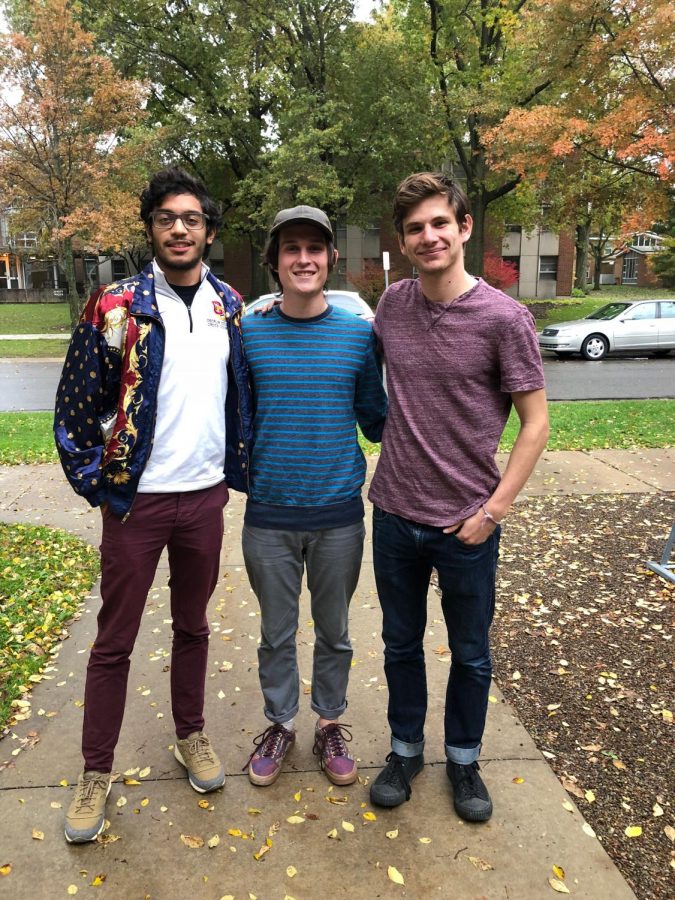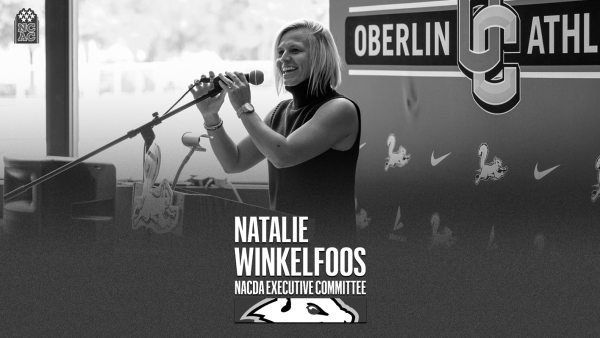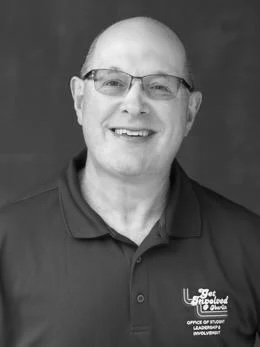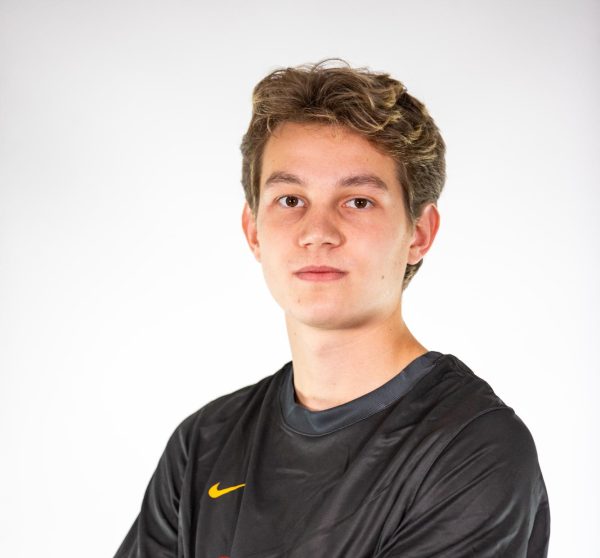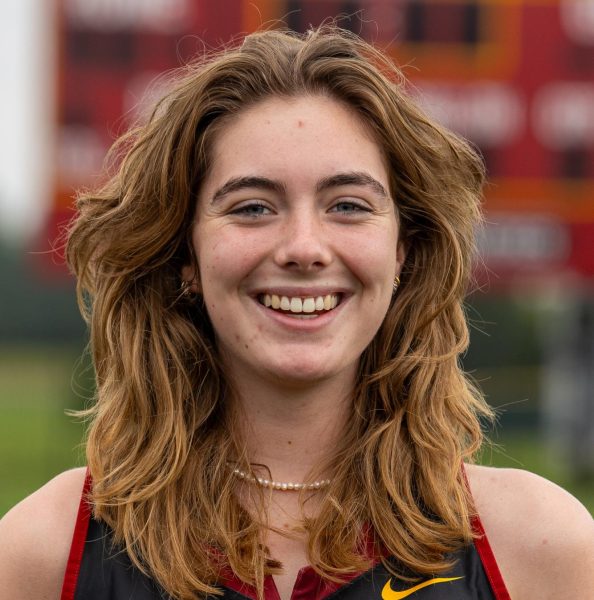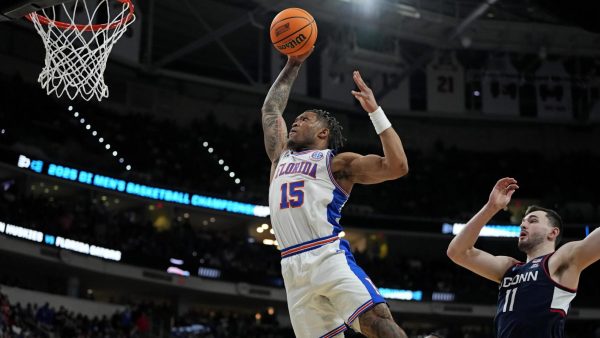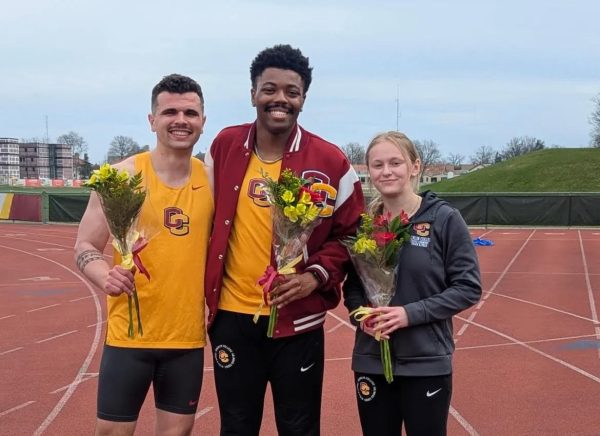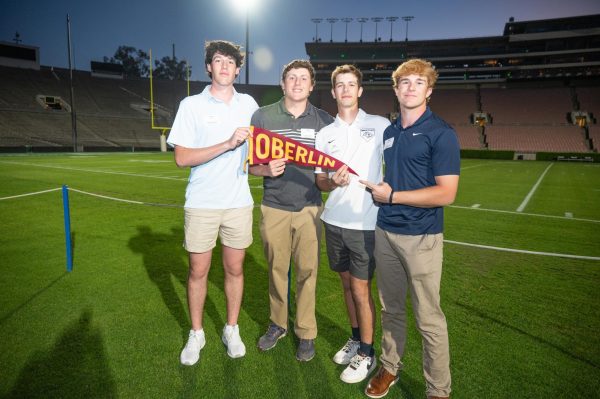In The Locker Room with Grant Sheely, Dylan Caban, and Jackson Daugherty, Men’s XC Captains
Dylan Caban, Jackson Daugherty, and Grant Sheely.
College senior and Biology major Dylan Caban came from a New Jersey high school cross country team that at one point consisted of a single person: him. At Oberlin, Caban has found a larger group of people with the same mindset in striving to be the best they can be. Likewise, College senior and Math and Physics double-major Grant Sheely appreciated coming from New York into a community of students who put themselves through intense training every week. College junior Jackson Daugherty, a California native and Cinema Studies major, confesses that he initially committed to cross country in the hopes it would help him get accepted into college; however, in his third year he reflects on how he loves having somewhere to be every day at 4 p.m. and seeing the empirical results of his and his teammates’ hard work. Together, the three led the men’s cross country team to a fifth-place showing at the North Coast Athletic Conference meet this past weekend.
This interview has been edited for length and clarity.
How do you feel about the team’s performance at conference this past weekend?
Grant Sheely: I feel really good about the men’s team performance. I feel like everyone I talked to … said they didn’t have the best race they wanted to have, and we still placed above our ranking, so that to me is an amazing sign. I’m really looking forward to regionals because of that, because I think that performance is a really good show of what we can do at regionals.
Jackson Daugherty: The whole energy at conference was really good and really positive, and people were doing a great job supporting each other. We had four first-years in our top seven [finishers], which is excellent and means we have a lot of great seasons going forward.
Dylan Caban: I’m really excited to see the newcomers perform in the next couple of years. I’ll definitely be looking at them and really looking forward to seeing what these guys can pull out during regionals. If their performances weren’t as good as they wanted them to be on Saturday, I think we’re going to see some real big things next week.
Grant and Dylan — you two have been on the team for four years now. What has changed throughout your time here?
GS: It’s been a really large transformative time for the team just because when we came [our first year], our team was the best cross country team that [Oberlin]’s ever had. We came in like fourth at regionals, and it was an unreal team. We had like a phoenix rebirth for the past four years, and now we’re back and it’s like this year with four freshmen in that class — they’re going to be an amazing team in three years; it’s going to be unreal to watch.
What do you think the team is missing? What’s the barrier to winning conference for y’all?
GS: I think our team is missing the large-scale buy-in that the women’s team has. The women’s team is huge — they almost double us in size, and they got that size because they were good, and they had that class a few years ago that brought in a lot more people and brought in like 12, 15 recruits every single year, whereas we bring about six recruits every year. So if one person is injured, it really affects the whole season. We’re kind of missing [size]. And I hope that it begins to build. As our men’s team [continues to do] better each year, I think we will get more and more athletes, and we’ve already had a better retention rate of our athletes every year. So I do think we’re getting there.
JD: I think experience is probably the number one thing. Like I said, we have four first-years in the top seven, and even the first-years that weren’t in the top seven have a lot of upside. We had two people on this team that I’m pretty sure it’s their first ever cross country season; they’ve only ever done track before this. So I think we’re on a very good trajectory right now, and once people are more used to racing eight kilometers and going through a whole college cross country season, we’re going to be super good. I don’t know if we’ll pass that barrier to win conference, but I hope so.
What have been the team’s strengths this season?
JD: I think people — especially the first-years — have found a very good balance between supporting each other and being competitive with each other for those spots [at] the regional and conference meets. People definitely want to get there, and they know they have to run with each other and beat each other to get there, but they still know, no matter what, that the angle is our whole success.
GS: Yeah, I would say our strength is definitely our tightness. Everyone really cares. I’ve never had more of a team where, when I finish my race and I wait in that section at the end of a race right by the finish line and the whole team basically waits there until the race is over. … So I would say we’re close-knit, and that’s one of our strengths.
How has the season gone for you all personally?
JD: I started the season with a knee injury and had a couple bad races, and then I came back from that and had a couple good ones, and then I had a foot injury and had a couple lesser-good ones, so it’s kind of like a bell curve. It was my first season as a captain, and I think I was definitely proud of the way the team bonded, which is something I was really trying to make sure happened in a good way. As a member of the whole, I think it was a very good season for me. As a runner, it was whatever.
GS: My season was a little bit less ideal than I wanted it to be. I came with larger hopes to be a dominant force the whole season. That kind of got changed up just by the amount of training that’s been coming through. I worked really hard this past summer, and so I had been working to get back to that level of speed because when you work so hard in stamina, you lose speed. And I’ve been kind of messing up my strategy each race. It’s like firing a bazooka — you can miss a lot. It might be a really powerful impact when it hits, but if you miss by a little bit, it messes it all up. So it’s been really hard to manage my strategies, just because it’s such a different thing of trying to win a race versus just running as fast as you can. But at the rumble I did a really good job, at conference I did a pretty good job, and I’m looking forward to regionals to do an even better job. I really think I’m getting my strategy right down to pat and doing what I need to be doing.
DC: It’s very funny. My first year I was out all season with injury. And lo and behold, my final year here, I was out all season with injury. I came in dealing with a little bit of Achilles [tendon] problems for six months and got back onto the horse, and then warming up for the first race, the Achilles [tendon] problem came back, and then my comeback race was going to be the rumble, and then I sprained my ankle during the race, so I did not finish that. But for me, the main goal after realizing my running season wouldn’t be as ideal as I’d want it was that I really wanted to be there as much as I could be for the rest of the team. And I think personally that was the most rewarding thing for me this season, just being able to be there at every race, cheer everyone on, and just be the greatest team member I could be without needing to step on that line.
For the seniors — what’s next in terms of cross country?
DC: Really looking forward to indoor season. We have a really good track squad, and we’re really excited to see what we can do in indoor and outdoor season. And for me, I’m going out to Spain to compete at the [ITU] Duathlon World Championships, so that’s what I’ll be doing in April.
GS: Yeah, I’m stoked for indoor and outdoor track. I’m telling you right now: Men’s team is going to win conference. I said that before; I’ll say it again. That’s going to happen. I am definitely going to keep running after college too. But not racing marathons — not doing that classic cliche. I will be racing local 5ks — that’s my goal. Win money, be the local 5k guy.
Jackson, next year you’ll be the only captain left from this group — how do you think team dynamics are going to change, and what are your hopes and plans for next year?
JD: Um, I’m hoping there’ll be another captain [laughter]. I definitely think in one year, we can’t reach the full potential that this team has. I’m hoping we’ll get more first-years. I think it’s going to be one of those years where you start to see the results, but it’s still technically a rebuilding year. Next year we’re going to have only three fourth-years, only three third-years, and maybe like seven second-years. But I think as long as we keep the camaraderie that this season had and the work people have done and the trajectory this season has had, we’ll have a really good year next year, even without these two wonderful people.


